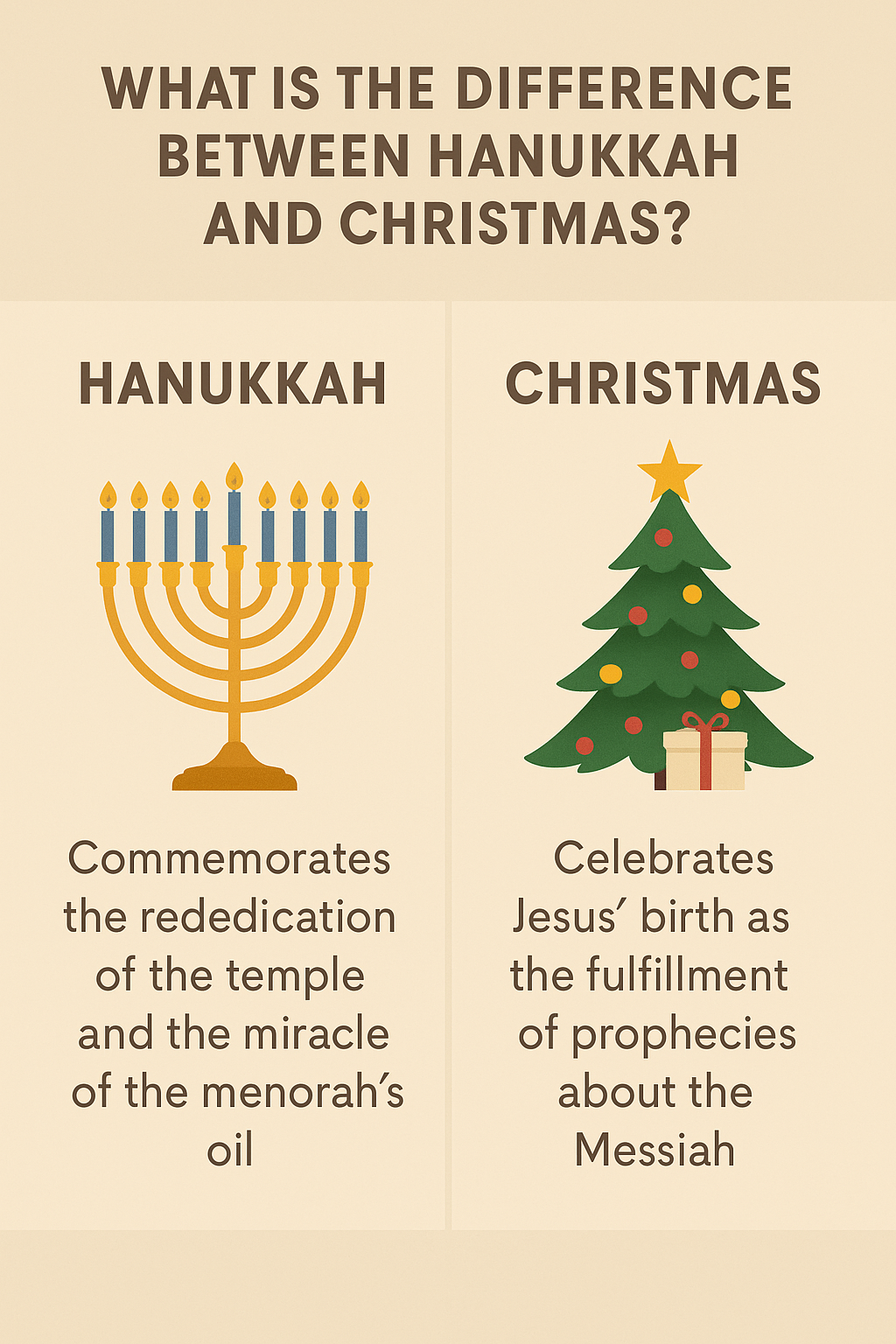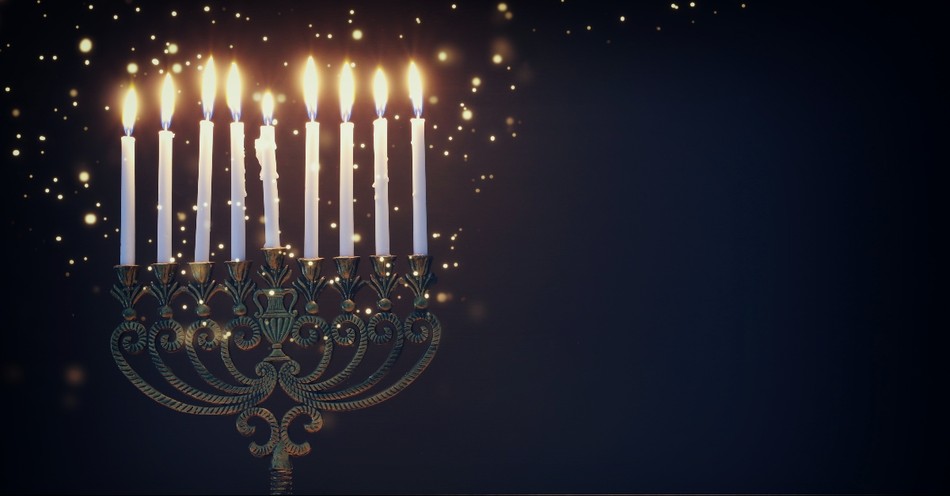Do Jewish people around the world celebrate Christmas, one of the most blessed times of year for Christians? At Christmastime, followers of Jesus revel in the joy and miracle of the birth of our Savior, who became incarnate from a virgin just over 2,000 years ago. Since Jesus was born a Jew, does that mean that Jewish people would honor His birth like Christians do?
To answer these questions, it's helpful to take a look at what the Jewish experience was like before Jesus was born. The first book of the Bible tells us about how God made a covenant with a man named Abraham around 2100 BC. The Jewish nation grew from his descendants, and spent much time under the rule of other countries from about 586 BC to 1948 AD. For hundreds of years they heard prophecies about a Messiah who would come to be a conquering king and save them from their oppressors.
God sent His own Son into the world to do just that, but not how the Jewish people expected. He sent a baby instead of a warrior. He sent One to offer forgiveness of sins, reconciliation with God, and eternal life instead of an earthly king. Some Jews accepted this gift from God and became the first Christians. Others didn’t believe Him to be the Savior, and remained Jewish by culture and religion, living under the law that God gave to Moses hundreds of years before.
Since Jewish people don’t believe in Jesus as Messiah, they don’t celebrate Christmas, which Christians celebrate as the day of His birth. However, they do celebrate Hanukkah, the 8-day Jewish holiday that occurs about the same time as Christmas every year, commemorating a miraculous event in Jewish history.
What Is the Difference Between Hanukkah and Christmas?
Christmas and Hanukkah are both based on historical events that show God's power and provision. They share a few things in common (candle-lighting, the giving of gifts), but they have very different meanings.
Christmas is the holiday that celebrates Jesus’ coming to earth to live and die as one of us and to reconcile us to God. This holy day recognizes the culmination of all of the prophecies about Jesus’ birth and life. In her article “Bible Verses That Prophesy Jesus’ Birth," Debbie McDaniel lists 10 prophecies that were fulfilled in Jesus’ incarnation. For example, in the 8th century BC, the prophet Isaiah wrote “Therefore the Lord himself will give you a sign: The virgin will conceive and give birth to a son, and will call him Immanuel” (Isaiah 7:14). The fulfillment of that prophecy happened 800 years later, as it says in Matthew 1:20-23, “But after he had considered this, an angel of the Lord appeared to him in a dream and said, 'Joseph son of David, do not be afraid to take Mary home as your wife, because what is conceived in her is from the Holy Spirit. She will give birth to a son, and you are to give him the name Jesus, because he will save his people from their sins.' All this took place to fulfill what the Lord had said through the prophet: 'The virgin will conceive and give birth to a son, and they will call him Immanuel'" (which means “God with us”). The New Testament is all about Jesus’ first coming and His second coming at the end of the age.
Hanukkah (which means “dedication”) on the other hand, reflects on a singular event that happened to the Jewish people in 168 BC. As mentioned, God allowed His chosen people to be conquered by several nations in succession, and at this time, they were ruled by Syrian Greeks who promoted Hellenistic culture and worship of Greek gods. Out of all of their oppressors, they were the most irreverent of God and Jewish worship of Him. Worse of all, they desecrated the Second Temple in Jerusalem, the most holy place for the Jewish people. The Jews decided to rebel, and a Jewish family called the Maccabees led a revolt that drove out many of the enemies and enabled them to cleanse and rededicate the temple.

Not only was it a miracle that they were able to overpower their enemies, but another miracle occurred which Jews commemorate during Hanukkah. In her article "What is Hanukkah," Hope Bolinger writes about this miracle. The tradition for each of the eight nights of Hanukkah is to light one of eight candles held by a candle holder called a “menorah.” “Where the menorah comes in hails from a Babylonian Talmud account… during the events of the Maccabean revolt, an oil jar burned for eight days straight, miraculous considering it probably wouldn’t have lasted more than a day.” The light burned in the temple, signifying God’s presence and provision. Therefore, Hanukkah is a celebration of God’s mercy and His power being made perfect in their weakness as the smaller, lesser-equipped nation.
This is the holiday that Jews celebrate around the time of Christmas, but to them it has everything to do with the Maccabean revolt, not with Jesus as Messiah.
How Do Messianic Jews Celebrate Christmas?
In some ways, Messianic Jews have the best of both worlds. They have the rich heritage of being part of God’s chosen people and can combine this with a transformative faith in Jesus as the promised Messiah.
It would follow that they would celebrate both Hanukkah and Christmas, and that may be true of some, but not true of others. There is some debate over whether Messianic Jews should celebrate Christmas. There is no doubt that their Savior came to earth, but some do not celebrate at Christmastime because they don’t believe Jesus was born on December 25. Some believe in celebrating Jesus at Hanukkah instead, reveling in the fact that He was the light who came into the world (and this light will never run out).
According to Jewish Voice, “Messianic Jews honor Yeshua’s [Jesus’] birth – just not necessarily at Christmas. The Jewish holidays contain prophetic pictures of Yeshua, making it easy for Messianic Jews to celebrate the Messiah’s coming throughout the year as they observe these biblical Feasts.” Just like Christians, Messianic Jews honor the whole life, death, and resurrection of Jesus 365 days a year, not just on one particular holy day.
Are There Jewish Influences on Christmas Traditions?
Whether we are Jewish or not, we can appreciate the Jewish roots of Christmas. According to the first chapter of Matthew’s gospel, our Savior’s genealogy includes God’s chosen people all the way back to Abraham. He came to earth to offer atonement for sins to Jews first before Gentiles. So everything about Jesus’ life, from birth to ascension, had to do with the fact that He came as a Jew.
It’s interesting to look at that fateful night in Bethlehem and think about the Jewish-ness of the event. First of all, an angel told a young Jewish virgin that she was going to have a son. Her fiance, according to Jewish tradition, was supposed to leave her, believing she had cheated on him. That was until an angel appeared to him as well, telling him she was going to give birth by the Holy Spirit. Then these two young Jewish people had to follow the Roman Caesar’s edict to go back to the husband’s hometown to be counted in a census. It just happened to be that it was the town of Bethlehem, as prophesied hundreds of years prior in the Old Testament. We love to create a Nativity that shows the holy family, the shepherds who were nearby, the Three Kings who came to visit the new “King of the Jews” - the entire scene was a distinctly Jewish one.
When it comes to celebrating, Christians light candles, often in an Advent wreath, which may have been influenced by the lighting of the menorah since the light represents God’s presence and gifts of love, joy, faith, and peace. Though the tradition of gift-giving is relatively new for those celebrating Hanukkah and Christmas, both may represent sharing the gifts that we ourselves have received from our heavenly Father.
Knowing that Jesus came into the world as a humble baby whose family was living under Roman occupation should remind us that this Jewish baby grew into a man who also humbled Himself on the cross for our salvation. And that both Christians and Jews will see Jesus come again “in glory to judge the living and the dead, and His kingdom will have no end.” (from the Nicene Creed).
Ways to Share Christ’s Love with Jews during Christmas
I think the best way to show Christ’s love to Jewish relatives, friends, and neighbors during Christmas is to first honor their celebration of Hanukkah. We can learn how they celebrate and see if it’s appropriate to give them a gift to celebrate the miracle that God provided the Jewish people. Perhaps we can respectfully ask to join in one of the nightly celebrations to learn more. Or Christians can invite these folks to their Christmas celebration if they are willing.
Without imposing Christian traditions, we can ask if we can talk about our Father Jehovah to them and how He provided for the Jewish people all throughout time. Respectfully, we can discuss the fact that Jesus was a Jew and how He would have celebrated Hanukkah and other Jewish holidays with His family, and what it would have been like back then. Ideally, the Lord would give us an opening to talk about ALL that Jesus did for the Jews and how He longs for them to believe in Him and be saved.
While we tend to focus on the story in the early part of Luke at Christmastime, I would encourage the examination of all of the prophecies in the Old and New Testament about Jesus’ first and second coming. If we were first-century Jews, would we also wonder if this baby was the One that God was sending as Messiah? I think the topic would be a great one for conversation with our Jewish friends and would lead to greater understanding about the Jewish roots of Christianity and why Jews should believe in Jesus as Messiah.
Photo Credit: ©iStock/Getty Images Plus/tomertu
Mary Oelerich-Meyer is a Chicago-area freelance writer and copy editor who prayed for years for a way to write about and for the Lord. She spent 20 years writing for area healthcare organizations, interviewing doctors and clinical professionals and writing more than 1,500 articles in addition to marketing collateral materials. Important work, but not what she felt called to do. She is grateful for any opportunity to share the Lord in her writing and editing, believing that life is too short to write about anything else. Previously she served as Marketing Communications Director for a large healthcare system. She holds a B.A. in International Business and Marketing from Cornell College (the original Cornell!) When not researching or writing, she loves to spend time with her writer daughter, granddaughter, rescue doggie and husband (not always in that order).
This article is part of our larger Christmas and Advent resource library centered around the events leading up to the birth of Jesus Christ. We hope these articles help you understand the meaning and story behind important Christian holidays and dates and encourage you as you take time to reflect on all that God has done for us through His Son, Jesus Christ!
What Is Advent: Meaning, History, and Traditions
Advent Prayers for Friends, Family, and More
What Is an Advent Wreath and How to Use One?
The History of Santa Claus: Origin of St. Nicholas
Christmas Bible Verses & Scripture Story
What is Christmas? True Meaning and Holiday History
Christmas Eve History and Traditions
Why Gold, Frankincense, and Myrrh?
When Was Jesus Born? Why December 25th
Where Was Jesus Born?




